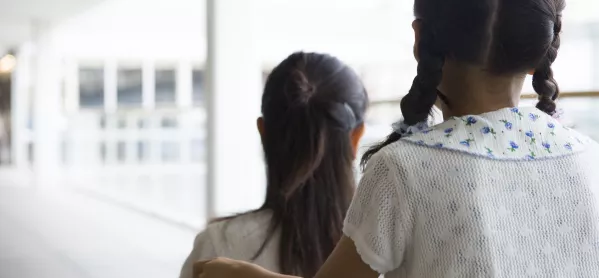- Home
- I was failed as a young carer. It still happens today
I was failed as a young carer. It still happens today

A recent BBC report estimated that there are possibly as many as 700,000 young carers living in the UK, many unknown to local authorities.
It is likely that many of us will have them in our classrooms, whether they have been flagged up to us or not.
The person I cared for was my mum.
Quick read: ‘Let’s open our eyes to the invisible students’
Quick listen: Why we need more support for mental health in primary
Want to know more? When does a child become an adult?
She was in a wheelchair and required day-to-day support and personal care. She had multiple sclerosis (MS); a debilitating neurological disease, which gradually weakened her entire body before finally causing her to slip into a coma when I was midway through Year 11.
As far back as I can remember, my twin sister and I cared for mum when dad was out of the house. She had lost the use of her arms and legs and was struggling with eating and speech.
We had been trained carefully how to lift mum in and out of bed using a hoist on the ceiling. We were also adept at feeding her, emptying her catheter and attending to her in her sleep.
Day and night
This is not an unusual experience for a young carer. According a Carer’s Trust survey, 80 per cent of young carers are carrying out caring duties every day and 46 per cent are having to perform them at night. These could include personal and physical care, daily tasks and emotional support.
I didn’t consider this element of my childhood unusual or unfair. I didn’t feel like I needed support because I didn’t know any different. In fact, caring for mum filled me with pride and taught me empathy.
I was surprised in 2004 when someone at school finally asked me about it. Up until then I had assumed that nobody knew as it had never been mentioned and mum didn’t attend school events.
The government’s Every Child Matters document, published in 2003, probably had something to do with it. The document claimed that young carers and their families would “benefit from targeted, sensitive help”.
My sister and I were invited to attend a group that was being set up in school. In the initial meeting, there were only four others. I was ecstatic about missing maths but had a feeling that if I continued to attend, other pupils might notice. This terrified me.
Both my sister and I had experienced bullying in junior school (the Carer’s Trust reports that 68 per cent of young carers experience bullying in schools) and I had spent the first three years of secondary desperately trying to fit in. I didn’t return to the group and nobody asked me about my caring role again.
Grappling with grief
Just two years later, mum fell into a coma before eventually passing away. Despite it being only a matter of weeks before the start of my exams, I was offered no support. Not one member of staff asked me how I was, offered advice on managing my grief alongside revision, or showed concern over my depleted attendance. It wasn’t that they didn’t care, the support systems and training for staff just didn’t exist.
It’s over a decade later and, according to a 2017 government report, two-thirds of young carers are still not receiving authority support and only 19 per cent have had an assessment of their situation.
Additionally, many say that nobody in their school is aware of their caring role. This is a big problem for young carers who are trying to access education. If they are unidentified and thus unsupported, the tiredness, loneliness and stress - among other things - could all have a negative impact on their wellbeing, their experiences of schooling and their overall attainment.
That said, there has certainly been a culture shift since my experiences in the 2000s. Young carers who have been identified are given access to some fantastic support systems and resources, and there is more open talk about disability and its impact.
I have also seen some amazing work going on in young carers groups with well-trained adults, and pupils have enjoyed telling me about the opportunities they’ve been given.
But when we consider that there are still thousands of unidentified young carers in the UK, many of whom are taking on inappropriate levels of responsibility at the expense of their wellbeing, there is clearly still some way to go in changing attitudes to ensure that all young carers and their families feel able to come forward and access this support without embarrassment, shame or fear of being judged by others.
Laura Tsabet is lead practitioner of teaching and learning at a school in Bournemouth. She tweets @lauratsabet
Keep reading for just £1 per month
You've reached your limit of free articles this month. Subscribe for £1 per month for three months and get:
- Unlimited access to all Tes magazine content
- Exclusive subscriber-only stories
- Award-winning email newsletters



